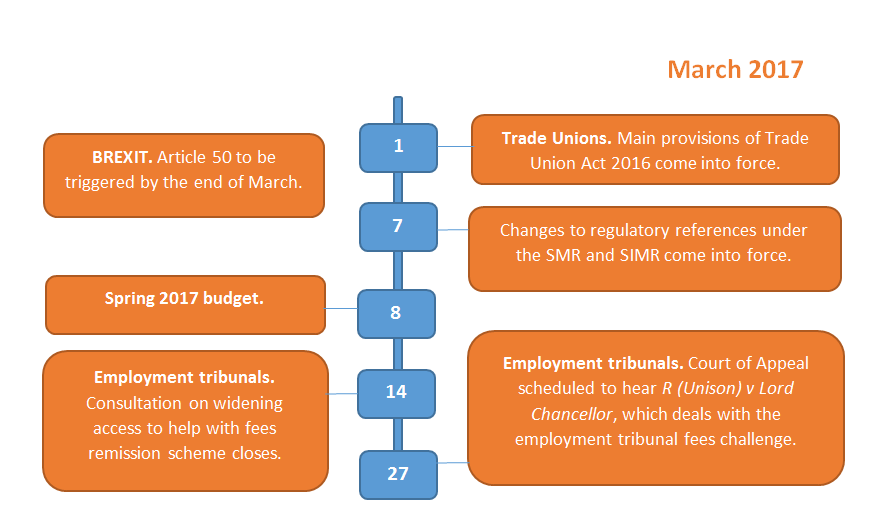Tribunal fees. Headline news this month is that the Ministry of Justice has finally published its long-awaited post-implementation review of employment tribunal fees. Although it believes fees are working well, the MoJ concedes that there has been a substantial drop off in claims, and is consulting on proposals to widen the means test for fee remission. It also decided to make claims against the national insurance fund exempt from fees, effective immediately.
Employment status. In another “gig economy” case, the Court of Appeal has upheld a tribunal’s decision that a plumber was a worker and not an independent contractor, despite the wording of his contract. The government has finally published a two-year-old report on employment status, although it has now been superseded by the Taylor review of employment status which is currently underway.
Tribunal procedure. The Court of Appeal has reiterated the principles that apply when a tribunal decides whether to permit a party to amend their case, in upholding a tribunal’s refusal to allow a claimant to add whistleblowing onto his unfair dismissal claim at a late stage.
Trade unions. The Court of Appeal agreed with the High Court that an employer’s agreement with a “sweetheart union” can block an independent union’s right to statutory recognition, and a tribunal has held that an employer’s attempt to resolve an impasse in negotiations with a recognised trade union by negotiating directly with individual employees amounted to an “unlawful inducement” under section 145B of TULRCA.
The main provisions of the Trade Union Act 2016 come into force on 1 March 2017, together with regulations defining the scope of the 40% balloting threshold for workers in important public services. The Wales Act 2017 has received Royal Assent, amending the Government of Wales Act 2006, which deals with devolution. It is unclear if the Act will derail the Welsh government’s plans to exempt Welsh public authorities from the Trade Union Act 2016.
Equalities. The EAT upheld an employment tribunal’s decision that refusal of a five-week holiday to attend religious festivals was not indirect discrimination, because the employee’s real reason for wanting the holiday was more about spending time with his family in Sardinia than attending religious festivals.
Acas and the Government Equalities Office have jointly published guidance on the Equality Act 2010 (Gender Pay Gap Information) Regulations 2017, setting out a step-by-step guide to complying with the regulations. The Equality and Human Rights Commission told Practical Law that it has accepted the government’s view that a failure to publish gender pay gap figures will be an “unlawful act” under the Equality Act 2006 (EqA 2006), triggering the EHRC’s enforcement powers.
It has been reported that gender diversity on boards is getting worse, not better. The Fawcett Society has launched an inquiry into UK sex discrimination laws amid fears over the impact of Brexit, and the House of Commons Women and Equalities Committee has called for legislation to ensure there is no “going backwards” on discrimination law when the UK leaves the EU. A report by the University of Manchester has called on employers and politicians to take a tougher stance against workplace racism, and the Work and Pensions Select Committee has published recommendations for reducing the disability employment gap.
There has been an increase in highly paid part-time roles, suggesting more employers are embracing work-life balance for senior staff. However, fathers who seek a better work-life balance are seen as “deviant” and suffer “negative bias” compared to their female counterparts, according to research by Plymouth University.
Pay and benefits. National minimum wage rates will change on 1 April 2017, including an increase in the national living wage from £7.20 to £7.50 an hour. Calls have been made for the government to guarantee minimum wage for “gig economy” workers. A record number of employers have been named and shamed for national minimum wage violations, and Argos has been ordered to pay £2.4million in minimum wage arrears to 37,000 workers. A report published by the Resolution Foundation shows that men in their twenties are earning less than the previous generation, leading to a reduction in the gender pay gap but for the “wrong reasons”.
Draft NICs regulations have been published for off-payroll working in the public sector, which will take effect on 6 April 2017. HMRC has issued guidance on the new regulations.
In other news, the government has published new tribunal compensation limits applicable from 6 April 2017, the database of employment tribunal judgments is now online, and Court of Appeal judges have been urged to cut down on verbiage in their judgments. Lloyd’s of London introduced a ban on workday drinking sessions to cut down on alcohol-related grievance and disciplinary issues. Registration for the online apprenticeship service has opened, and an employers’ network to promote diversity in apprenticeships has been set up.
In our blog, Sarah Chilton and Wonu Sanda analyse the plan for Brexit and the potential implications for UK employment law, Anna Beale, Caspar Glyn QC and Nathaniel Caiden summarise their submissions to the Taylor Review on employment status, Clare Gregory and Kate Hodgkiss look at areas of ambiguity and uncertainty surrounding the gender pay gap regulations. Marianne Tutin blogs about the potential implications for employers following HMCTS’s decision to publish employment tribunal judgments online, while Sophie McGuinness examines how the judgments database might affect employees. Finally, Tom Casey from Public Concern at Work argues that the legal landscape for whistleblowers has become increasingly hostile.
Next month
Key developments to look out for in March 2017.

For recent and forthcoming developments, don’t forget What to expect in employment law, Case tracker and Legislation tracker.



